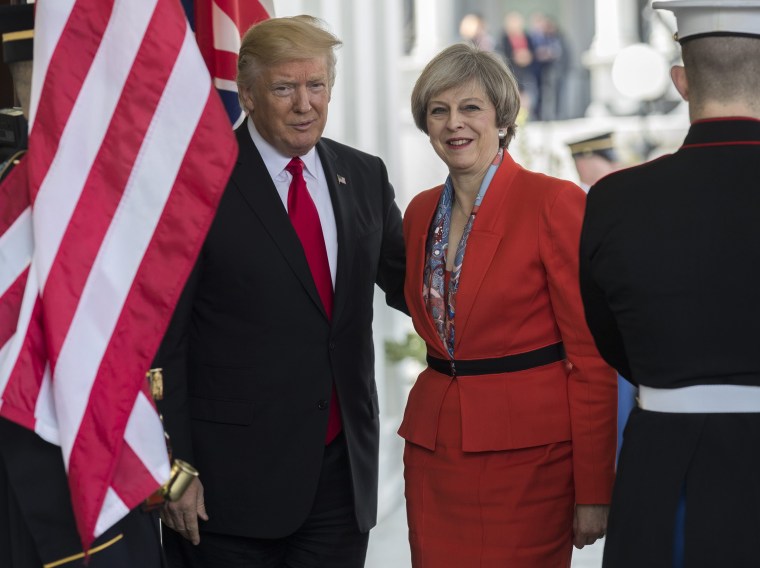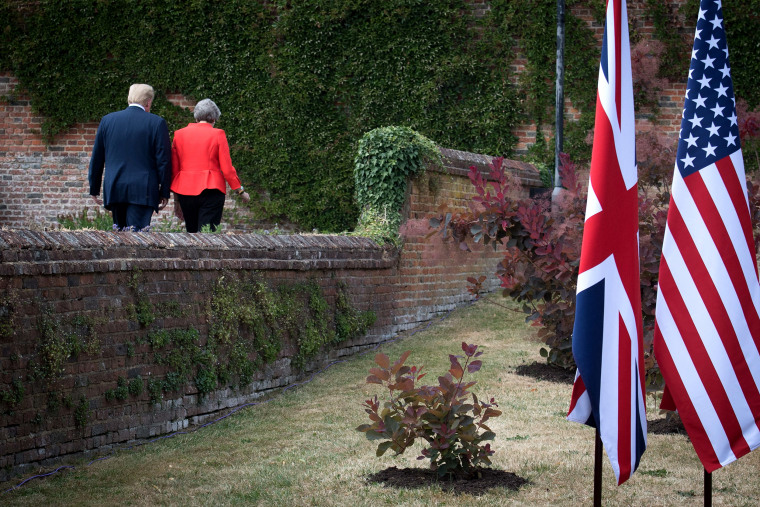LONDON — President Donald Trump once dubbed himself “Mr. Brexit.”
But as the U.K. prepares for its imminent divorce from the European Union in just 25 days, some are not feeling the love from Washington they may have expected.
Trump last week praised his “very special relationship” with North Korean leader Kim Jong Un — before their nuclear summit in Vietnam collapsed without agreement — raising eyebrows by using a term usually reserved for the bond between the U.K. and the U.S.
Brian Klaas, an assistant professor in global politics at University College London who is critical of Trump, says the use of the phrase “special relationship” to apply to Kim "is further evidence that Trump is willing to throw allies under the bus while cozying up to autocrats."
The term "special relationship" was made famous by Winston Churchill after World War II and has been nurtured by presidents and prime ministers for decades.
But Trump's presidency and the realities of Brexit appear to have distanced the two nations on multiple fronts.
Prime Minister Theresa May was the first international leader to visit the White House after Trump's election victory, but the "special relationship" between the United States and Britain has nonetheless taken a beating since Trump took office.
The president's visit to the U.K. last July was met with mass protests in London, Glasgow and Edinburgh — as well as outside his Scottish coastal resorts — as Brits expressed their views on everything ranging from his domestic policies to his criticism of London Mayor Sadiq Khan.
The visit was further mired in controversy by Trump’s remarks to a British tabloid in which he torched May over her handling of the U.K.'s impending exit from the E.U. However, he praised May during their face-to-face meeting and expressed his desire for a future bilateral trade deal.

"The fundamental national interests of both the U.K. and the U.S. are closely linked," Klaas said. "Trump has damaged that relationship, by insulting Britain’s prime minister, lashing out at London’s mayor and slapping tariffs on the U.K. as though it were an adversary rather than a crucial ally."
But it's the issue of trade that has helped renew discussion of the virtues of the alliance.
Supporters of Britain's decision to leave the E.U. following the June 2016 referendum have claimed it would allow Britain to ally itself ever closer with the U.S.
Yet despite Trump's professed support for Brexit and apparent relationship with one of its chief architects, Nigel Farage, his tenure as president has so far yielded little more by way of progress.
Tim Oliver, a senior lecturer at the Institute for Diplomacy and International Governance at Loughborough University London, said it was clear there was no "special relationship" when it came to trade negotiations.
“The U.K.-U.S. special relationship can point to strong and very large economic links, but that doesn’t mean — and never has meant — any U.S. president, or more importantly Congress, would simply give the U.K. what it wants or cut it favors unless it serves the U.S. national interest," he said. “Anybody in the U.K. involved in U.K.-U.S. trade negotiations who believes the U.S. will cut the U.K. a good deal out of sentimental love for the U.K. is naive and dangerous.”
Some opponents of Brexit have expressed concerns that a trade accord with the U.S. would potentially result in products including chlorine-treated chicken and genetically modified crops on supermarket shelves, items which are currently not sold in the E.U. However, U.K. government ministers have insisted they would not lower food standards to win trade deals.
Oliver says the core of the “special relationship” between the U.K. and U.S. is focused around nuclear weapons, intelligence sharing and special forces — areas where the two allies trust each other in ways they don’t trust others.
Jeremy Shapiro, research director at European Council on Foreign Relations, a pan-European think tank, argued it is unlikely Trump was trying to send a message of any kind to the U.K. by using the term "special relationship" to refer to Kim.
“Trump rarely considers the larger ramifications of his language, nearly always reaches for hyperbole, and tends to use words like 'special' with reckless abandon,” Shapiro said.



